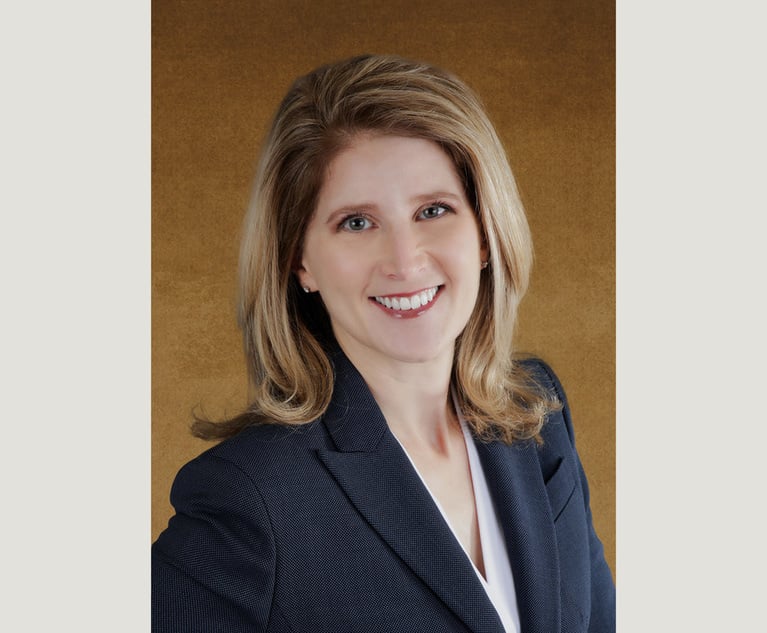How to Redo Estate Plans and Save on Taxes Under New Tax Reforms
Recent changes to the federal estate tax system have turned traditional estate planning on its head. Now under the new Tax Cuts and Jobs Act, most traditional estate plans for a married couple are likely to increase taxes at death, instead of saving taxes. This means attorneys who want to keep their clients happy had better redo existing estate plans and shift the focus of estate planning services moving forward.
February 12, 2018 at 09:15 AM
7 minute read

Recent changes to the federal estate tax system have turned traditional estate planning on its head. Now under the new Tax Cuts and Jobs Act, most traditional estate plans for a married couple are likely to increase taxes at death, instead of saving taxes. This means attorneys who want to keep their clients happy had better redo existing estate plans and shift the focus of estate planning services moving forward.
Here's the reason for such dramatic change: For years, the traditional estate plan has directed that two trusts be established at the death of the first spouse: a marital trust and a credit shelter or residuary trust, also called A/B trusts. These trusts are designed to reduce estate tax, but there are additional income tax costs associated with them. Now with the new $11.2 million federal estate tax exemption, and the ability of a married couple to use both spouses' exemptions at the death of the surviving spouse, most married couples do not have taxable estates and will not owe federal estate tax at death. As a result, the major benefits of a traditional estate plan are now non-existent, and the following major drawbacks remain.
Capital Gains Tax
Under the new tax reforms, married couples who do not have taxable estates need to replace their traditional estate plan with an estate plan that minimizes capital gains exposure.
In the traditional estate plan that many people currently have, a credit shelter trust is funded up to the decedent's estate tax exemption, and any remaining assets are distributed to the marital trust. The credit shelter trust is taxed in the decedent's estate, but since it uses the decedent's estate tax exemption, no estate tax is due. When the surviving spouse dies, the credit shelter trust is not included in the surviving spouse's estate. This type of planning is intended to avoid estate tax at the first spouse's death and minimize estate tax exposure at the death of the surviving spouse. However, one of the downsides to a credit shelter trust has always been that the appreciation of the assets between the first spouse's death and the surviving spouse's death is subject to capital gains tax when those assets are sold.
There are alternatives that minimize capital gains exposure, while allowing married couples to tailor their estate plan to their specific family situation and create a tax efficient plan.
A “Sweetheart Will,” where both spouses leave all their assets to their surviving spouse, outright and free of trust, is the simplest way to minimize capital gains. Outright distribution to the surviving spouse is a tax effective strategy for married couples with a combined estate of $22 million or less. There is a catch: The increased estate tax exemption is in place until 2026, when the estate tax exemption will return to 2017 requirements unless Congress steps in. A good estate plan must take into consideration the possibility of this sunset and provide flexibility to do post-mortem tax planning. One option is to give the surviving spouse the ability to disclaim assets to fund a trust for the benefit of the surviving spouse.
Sometimes a “Sweetheart Will” and its outright distribution to the surviving spouse is not appropriate. For instance, some couples (especially those in second marriages) may not want to give the surviving spouse complete control over the couple's assets and control over who will inherit at the surviving spouse's death. In these situations, a QTIP Trust (qualified terminable interest in property trust) for the surviving spouse is ideal. A QTIP Trust is a special type of trust authorized by the Internal Revenue Code. It is held for the benefit of the surviving spouse during the spouse's lifetime, but the deceased spouse has already selected the beneficiaries who inherit upon the surviving spouse's death. Such trusts should be drafted so that the decedent spouse's assets are included in the surviving spouse's estate and therefore qualify to be “stepped-up” to the value of the property on the date of death, and then “stepped-up” again when the surviving spouse dies. These provisions eliminate capital gains tax.
Another option to consider is asset ownership. With a traditional estate plan, married couples often had to divide marital assets between them, so that each spouse owned approximately one-half of the combined assets. This was necessary to ensure that the credit shelter trust would be funded at the first spouse's death. By retitling assets in joint names, you ensure that the assets automatically pass to the surviving spouse, outright and free of trust, upon the first spouse's death.
Income Tax Burden
Another major drawback of the traditional estate plan is that it can increase the overall income tax burden.
The reason is that the traditional marital and credit shelter trusts are separate entities for income tax purposes, and each trust is required to file its own income tax returns. Whether the trust will owe income tax depends largely on whether the income was distributed to the beneficiary (in which case the beneficiary pays the income tax,) or accumulated inside the trust (in which case the trust pays the income tax.)
At the same time, because the income tax rate brackets for trusts are compressed, a trust will pay significantly more in income tax than an individual with the same amount of income. For instance, a trust reaches the highest marginal income tax rate of 37 percent when it has $12,500 in taxable income. By comparison, a single taxpayer does not reach the 37 percent income tax bracket until he or she has taxable income of $500,000, and a married couple does not reach this bracket until they have $600,000 of taxable income.
A trust is also subject to the net investment income tax, a 3.8 percent tax on certain investment income like interest, dividends, rents, royalties and capital gains, when it has $12,500 of income. Single taxpayers are only subject to the net investment income tax on their modified adjusted gross income over $200,000, and married taxpayers are only subject to the tax on their modified adjusted gross income over $250,000.
So here are other options to consider: An outright distribution to the surviving spouse (instead of a trust for the benefit of the beneficiary) eliminates the income tax burden. There is no requirement to file a separate income tax return, the beneficiary has the benefit of the individual income tax brackets, and the threshold to pay net investment income tax is much higher. Jointly owning assets also eliminates the income tax burdens associated with trusts. A QTIP Trust provides some income tax relief. A QTIP trust is a separate entity and is required to file its own income tax return, the trust's income is distributed to the surviving spouse and the surviving spouse pays the income tax at his or her marginal rate using the individual income tax rate brackets. To the extent that the QTIP trust retains capital gains as part of the principal of the trust, it will be subject to the net investment income tax on its income in excess of $12,500.
Looking Ahead
I mentioned that unless Congress steps in, by 2026, the base estate tax exemption will revert to $5 million per person with an index for inflation that brings it to an estimated $6 million to $6.5 million per person. That's far less than the 2018 estate tax exemption of $11.2 million per person, which will only increase with inflation over the next seven years. Whatever the future brings, one thing is certain: This is a time of profound change for tax and estate attorneys, and the ability to educate clients on the need to update their estate planning documents, as well as advise effectively, will ensure the financial well-being of their clients.
P. Kristen Bennett is a partner at Gawthrop Greenwood. She focuses her practice on estate planning and trust administration in Pennsylvania and Delaware. She also provides counsel on taxation and tax planning for businesses. She can be reached at [email protected] or 610-696-8225.
This content has been archived. It is available through our partners, LexisNexis® and Bloomberg Law.
To view this content, please continue to their sites.
Not a Lexis Subscriber?
Subscribe Now
Not a Bloomberg Law Subscriber?
Subscribe Now
NOT FOR REPRINT
© 2025 ALM Global, LLC, All Rights Reserved. Request academic re-use from www.copyright.com. All other uses, submit a request to [email protected]. For more information visit Asset & Logo Licensing.
You Might Like
View All
Pa. Supreme Court to Decide Enforceability of 'Browsewrap' Arbitration Agreements
8 minute read
From a Mediator’s Perspective: Common Mis-steps That Parties Make at Mediation
6 minute readTrending Stories
- 1Public Notices/Calendars
- 2Wednesday Newspaper
- 3Decision of the Day: Qui Tam Relators Do Not Plausibly Claim Firm Avoided Tax Obligations Through Visa Applications, Circuit Finds
- 4Judicial Ethics Opinion 24-116
- 5Big Law Firms Sheppard Mullin, Morgan Lewis and Baker Botts Add Partners in Houston
Who Got The Work
J. Brugh Lower of Gibbons has entered an appearance for industrial equipment supplier Devco Corporation in a pending trademark infringement lawsuit. The suit, accusing the defendant of selling knock-off Graco products, was filed Dec. 18 in New Jersey District Court by Rivkin Radler on behalf of Graco Inc. and Graco Minnesota. The case, assigned to U.S. District Judge Zahid N. Quraishi, is 3:24-cv-11294, Graco Inc. et al v. Devco Corporation.
Who Got The Work
Rebecca Maller-Stein and Kent A. Yalowitz of Arnold & Porter Kaye Scholer have entered their appearances for Hanaco Venture Capital and its executives, Lior Prosor and David Frankel, in a pending securities lawsuit. The action, filed on Dec. 24 in New York Southern District Court by Zell, Aron & Co. on behalf of Goldeneye Advisors, accuses the defendants of negligently and fraudulently managing the plaintiff's $1 million investment. The case, assigned to U.S. District Judge Vernon S. Broderick, is 1:24-cv-09918, Goldeneye Advisors, LLC v. Hanaco Venture Capital, Ltd. et al.
Who Got The Work
Attorneys from A&O Shearman has stepped in as defense counsel for Toronto-Dominion Bank and other defendants in a pending securities class action. The suit, filed Dec. 11 in New York Southern District Court by Bleichmar Fonti & Auld, accuses the defendants of concealing the bank's 'pervasive' deficiencies in regards to its compliance with the Bank Secrecy Act and the quality of its anti-money laundering controls. The case, assigned to U.S. District Judge Arun Subramanian, is 1:24-cv-09445, Gonzalez v. The Toronto-Dominion Bank et al.
Who Got The Work
Crown Castle International, a Pennsylvania company providing shared communications infrastructure, has turned to Luke D. Wolf of Gordon Rees Scully Mansukhani to fend off a pending breach-of-contract lawsuit. The court action, filed Nov. 25 in Michigan Eastern District Court by Hooper Hathaway PC on behalf of The Town Residences LLC, accuses Crown Castle of failing to transfer approximately $30,000 in utility payments from T-Mobile in breach of a roof-top lease and assignment agreement. The case, assigned to U.S. District Judge Susan K. Declercq, is 2:24-cv-13131, The Town Residences LLC v. T-Mobile US, Inc. et al.
Who Got The Work
Wilfred P. Coronato and Daniel M. Schwartz of McCarter & English have stepped in as defense counsel to Electrolux Home Products Inc. in a pending product liability lawsuit. The court action, filed Nov. 26 in New York Eastern District Court by Poulos Lopiccolo PC and Nagel Rice LLP on behalf of David Stern, alleges that the defendant's refrigerators’ drawers and shelving repeatedly break and fall apart within months after purchase. The case, assigned to U.S. District Judge Joan M. Azrack, is 2:24-cv-08204, Stern v. Electrolux Home Products, Inc.
Featured Firms
Law Offices of Gary Martin Hays & Associates, P.C.
(470) 294-1674
Law Offices of Mark E. Salomone
(857) 444-6468
Smith & Hassler
(713) 739-1250







